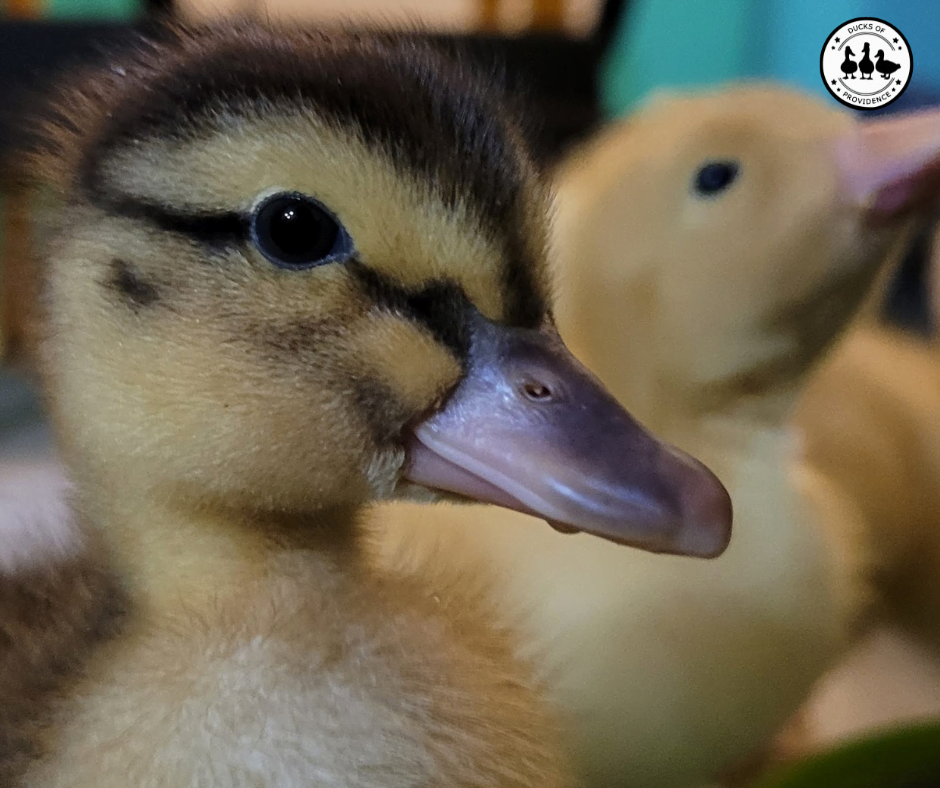
How to Raise Ducklings: A Beginners Guide
Last updated on January 15th, 2026 at 02:15 pm
So, you’ve decided to dive into the adorable world of raising ducklings! Congratulations on this quacky adventure. Whether you’re a seasoned duck parent or a newbie to duck parenting, raising ducklings can be a delightful and rewarding experience. Here’s a beginner’s guide on how to raise ducklings to help you get started on the right webbed foot:

Ducks of Providence is free, thanks to reader support! Ads and affiliate links help us cover costs—if you shop through our links, we may earn a small commission at no extra cost to you. Thanks for helping keep our content free and our ducks happy! 🦆 Learn more
Choosing Ducklings: Finding Your Feathered Friends
When it comes to choosing your ducklings, there are a few things to consider:
- Breed Selection: Ducks come in all shapes, sizes, and colors! Research different breeds to find the ones that suit your needs and preferences. Popular breeds for beginners include Call Ducks, Khaki Campbells, and Indian Runners.
- Sourcing: You can find ducklings at local hatcheries, farm supply stores (not recommended for pet ducks), or even through online sources. Make sure to choose reputable sources that prioritize the health and welfare of their birds. We got our ducklings from Metzer Farms.
- Quantity: Decide how many ducklings you want to raise. Ducks are social creatures and thrive in groups, so you should get at least two to provide companionship.
Setting Up Your Brooder: Creating a Cozy Nest
Before bringing your ducklings home, you’ll need to set up a warm and safe environment for them to grow and thrive:
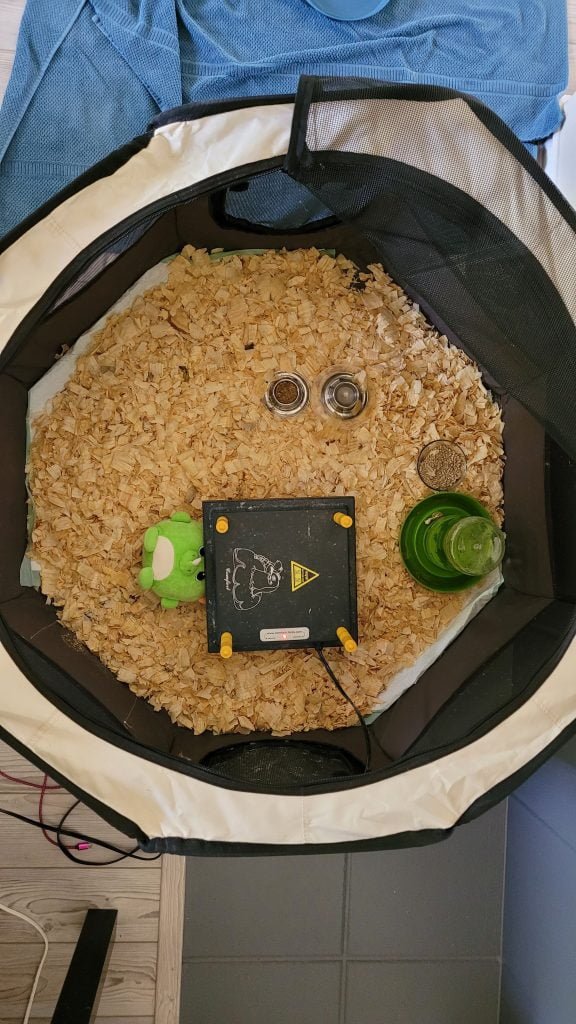
- Brooder Box: A large plastic tub or a foldable playpen works well as a brooder box. Make sure it’s spacious enough to accommodate your ducklings as they grow.
- Bedding: Line the bottom of the brooder with non-toxic bedding such as straw, wood shavings, or paper towels. Avoid using cedar shavings, as they can be harmful to ducklings.
- Heat Source: Ducklings need warmth, especially during their first few weeks of life. We recommend using a heating plate and NOT a heat lamp. This will be much safer for your ducklings. Heat lamps pose a fire hazard. And the temperature is also sot so easy to regulate. We will discuss the heat requirements below. Make sure to monitor the temperature regularly and adjust as needed.
- Water: Provide shallow water dishes or a chick waterer for drinking. Do not give them access to deep water bowls. Ducklings can drown! Their fuzzy feathers will soak up all the water because they are not yet waterproof.
- Food: Provide a shallow dish for feeding. Use duckling starter feed as it contains the essential nutrients ducklings need for healthy growth. Read more about their nutritional needs below.
Heat Requirements: Keeping Ducklings Warm
Ducklings rely on external sources of heat to maintain their body temperature, especially during their first few weeks of life. Here’s how to provide the right amount of heat at different ages:
- First Week: Keep the brooder temperature at around 90°F (32-35°C) for newly hatched ducklings. Use the brooder heater plate positioned at a low height, allowing ducklings to move under or farther away from the heat source as needed.

- 2-4 Weeks: Gradually reduce the brooder temperature by 7°F (3-4°C) each week (one degree Fahrenheit per day) until reaching ambient room temperature. You can easily do that by adjusting the height of the heating plate. Ducklings should be comfortable at room temperature (around 70-75°F or 21-24°C) by the time they are 3-4 weeks old.
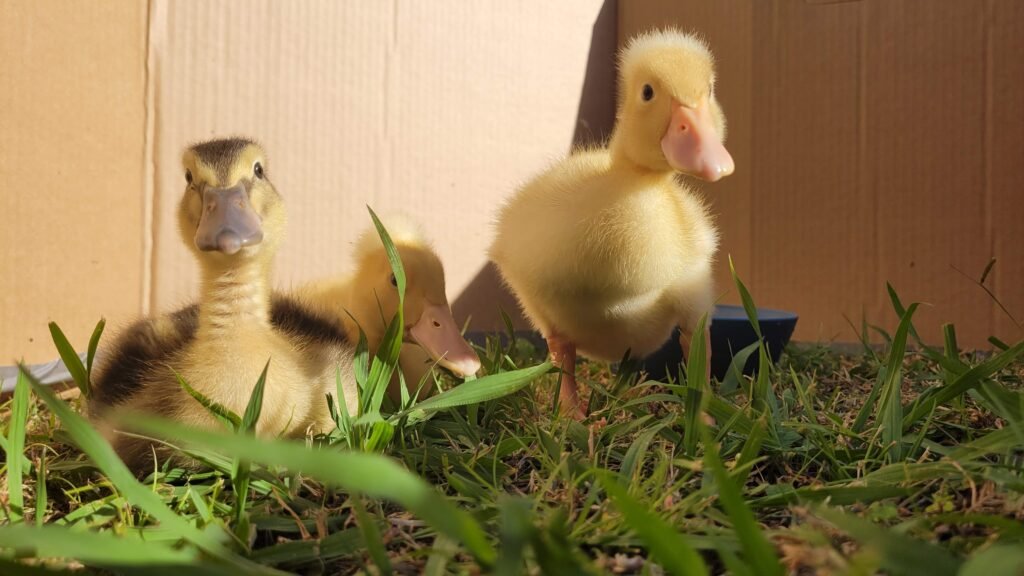
- 5-6 Weeks: Once ducklings are almost fully feathered and accustomed to room temperature, you can remove the heat source during the day and only provide supplemental heat at night if temperatures drop significantly.

- 6-7 Weeks: By this age, ducklings should be able to regulate their body temperature effectively and no longer require supplemental heat. You can safely move them outside unless it is extremely cold. Monitor them closely during colder weather and provide shelter if necessary.
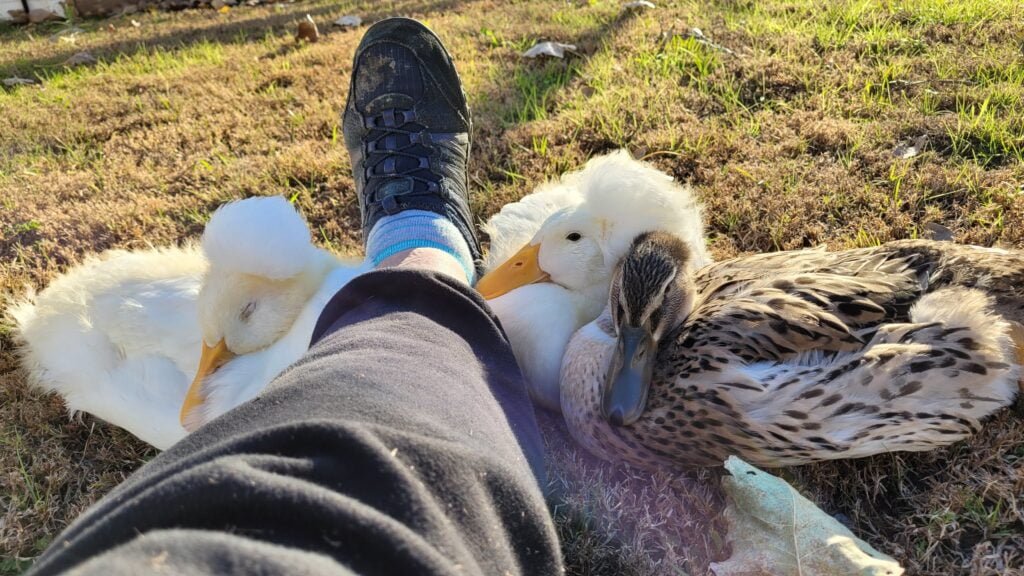
Feeding Ducklings: Nutritional Needs
Ducklings have specific dietary requirements to support their rapid growth and development.

We love this Duckling & Gosling Starter and Grower Food from Manna Pro. It is formulated to meet the nutritional needs of waterfowl.
Understanding the Importance of Niacin for Ducklings
When it comes to raising happy and healthy ducklings, paying attention to their nutritional needs is crucial. One essential nutrient that often gets overlooked is niacin, a form of vitamin B3. Ducklings need 2-3 times more Niacin than chicks. Let’s dive into why niacin is so important for your fluffy companions and how you can ensure they get enough of it.
What is Niacin?
Niacin plays a vital role in various bodily functions, including:
- Metabolism: Niacin helps convert food into energy, ensuring your ducklings have the fuel they need to grow and thrive.
- Nervous System Function: It supports proper nerve function, which is essential for your ducklings’ coordination and overall health.
- Skin and Feather Health: Niacin contributes to healthy skin and feathers, keeping your ducklings’ plumage shiny and vibrant.
Why Do Ducklings Need Extra Niacin?
Ducklings have higher niacin requirements compared to many other poultry species. A niacin deficiency can lead to a condition called “perosis” or “slipped tendon,” which affects leg development and can cause deformities or lameness. This is particularly crucial during the rapid growth phase in the first few weeks of life.
How to Ensure Your Ducklings Get Enough Niacin:
It is recommended that ducklings get >70mg of Niacin per kg feed (or 10 mg of Niacin per day). Adult ducks should get 12.5 mg per day and at least 50 mg of Niacin per kg feed.
Here are some practical tips to ensure your ducklings receive adequate niacin:
- Balanced Diet: Provide your ducklings with a balanced diet formulated specifically for their needs. Commercial duckling starter feeds often contain sufficient niacin levels. Ensure the feed you choose meets their niacin requirements.
- Supplementation: If you’re unsure about the niacin content in their feed or if you’re only able to find chick starters, consider supplementing their diet with additional niacin. You can do this by adding brewer’s yeast to their feed or niacin supplements to their water as recommended by Metzer.

We have supplemented our duckling’s drinking water with this Niacin just to be on the safe side. We added 150 mg of niacin to a gallon of water using a small measuring spoon.
Here’s how to feed them at different ages:
- 1-2 Weeks: Start with a high-quality duckling starter feed, ideally with a protein content of around 20-22%. Crumbles are best at this age stage. You should have food available 24/7. You can mix it with water to make a mash. That will make it easier for the ducklings to eat it without choking.
- 3-8 Weeks: Transition to a grower feed with a slightly lower protein content (around 15-16%). You can mix the starter feed with uncooked oats to get to the lower protein level. You can also introduce small amounts of duckling treats like mealworms or scrambled eggs for variety at this stage. Ducklings can also start foraging for insects and small plants outdoors if weather permits.
- 8-18 Weeks: By this age, your ducklings can transition to a maintenance feed suitable for adult ducks. Aim for a protein content of around 15%, and provide plenty of fresh water for drinking and swimming.
- 18+ Weeks: Continue feeding maintenance food. This comes typically in the form of pellets. Here again, ensure to purchase duck-specific food to meet their nutritional requirements. If you have laying hens, you should supplement with oyster shells to ensure they get enough calcium for strong eggshells. You can also get layer food, which is already rich in calcium, BUT this is not recommended when you have drakes as part of your flock. Read more about feeding adult ducks in our post “What Do Ducks Eat? Your Guide To Feeding Ducks“.
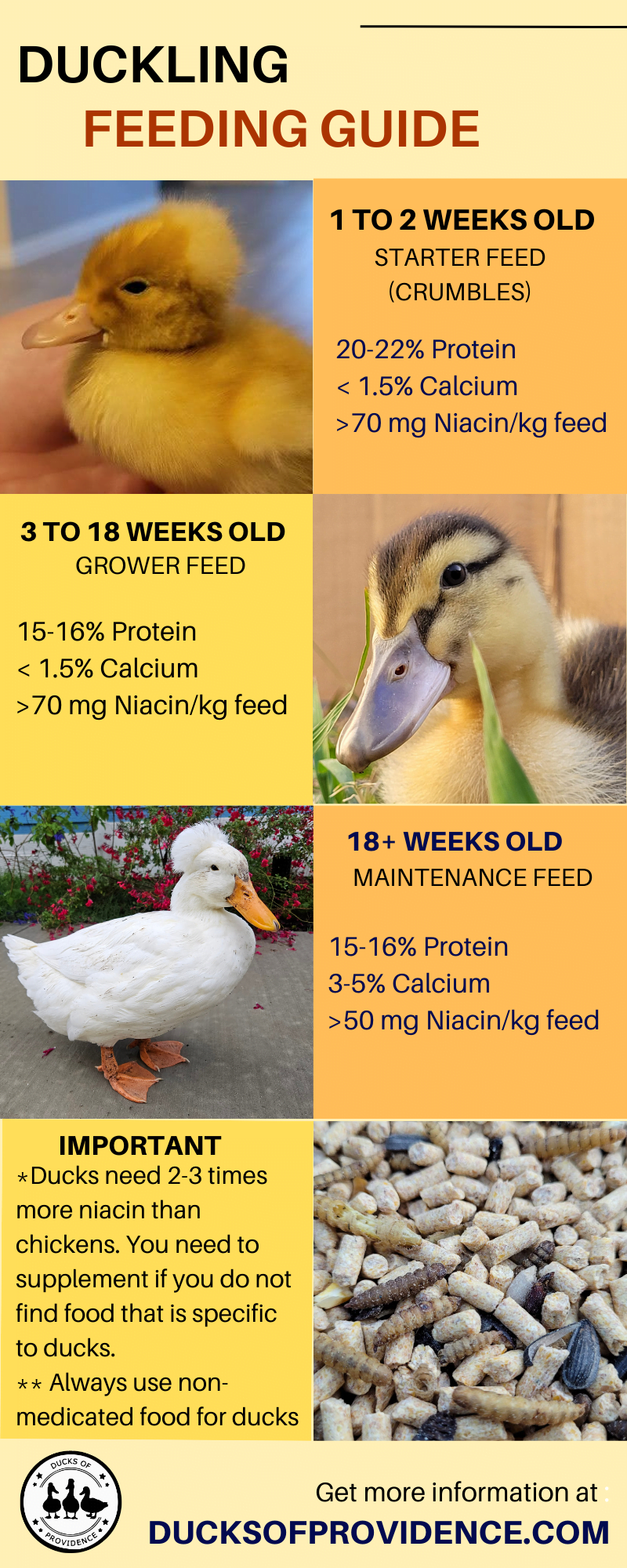
Ducklings and Water
Are Ducklings Waterproof?
While ducks are often associated with water, it’s essential to understand that ducklings are not inherently waterproof like their adult counterparts. In fact, when ducklings hatch, their downy feathers lack the natural oils necessary for buoyancy and insulation.
However, water plays a vital role in the health of ducklings’ skin and feathers. As they grow, ducklings need to stimulate their oil gland located near the base of their tail by preening and spreading oil throughout their feathers. This process helps make their feathers waterproof, enabling them to stay dry and buoyant in the water as they mature into adult ducks. Therefore, while ducklings may not be born waterproof, water is still an integral part of their upbringing and overall well-being.
Additionally, water plays a crucial role in their development. Ducklings instinctively seek out water for drinking, bathing, and even playing. Exposure to water helps them learn essential skills such as swimming and foraging for food.
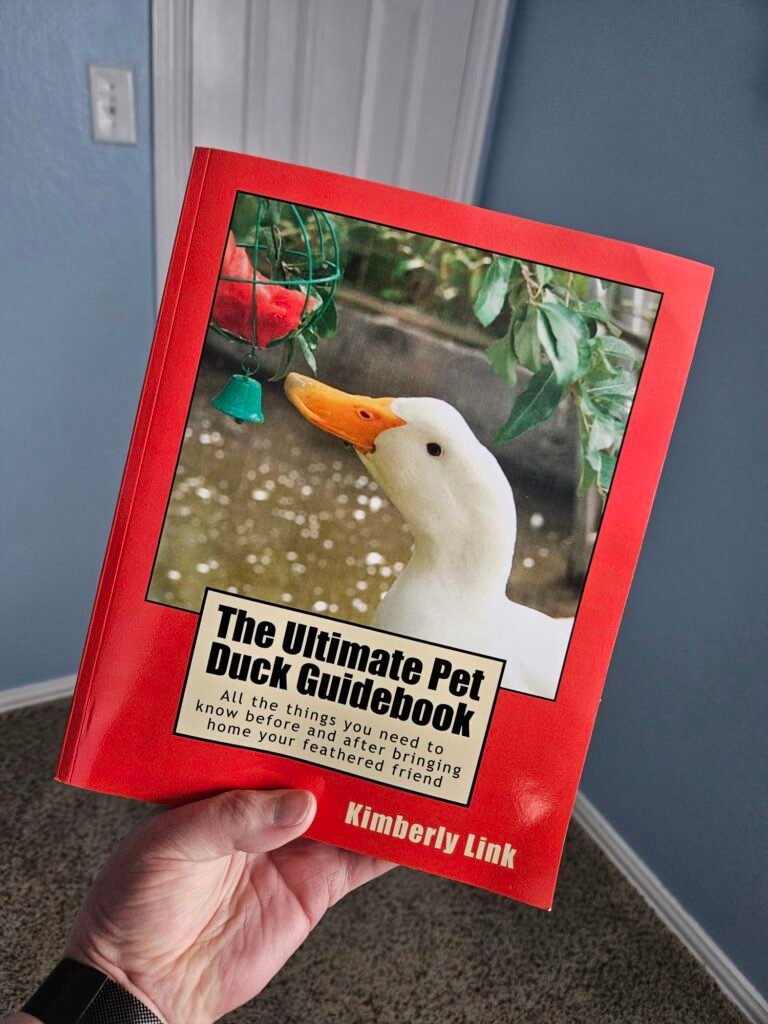
This is the BEST book about ducks I have ever had. I can highly recommend it to every duck owner, new or experienced. It is very comprehensive with pictures and illustrations. It covers all topics related to duck care and keeping ducks. It even has multiple case studies.
Safety Measures Every Owner Should Know
Ducklings’ relationship with water comes with important safety considerations, especially when they are very young. While water is essential for their development, ducklings can drown if left unsupervised in deep water, particularly during their first few weeks of life.
It’s crucial to provide them with access to shallow water under close supervision, ensuring they can safely splash and paddle without the risk of submersion. After their water adventures, ducklings need warmth to dry off and regulate their body temperature effectively. Without proper warmth and drying, they can become chilled and susceptible to illness. Therefore, it’s essential to provide a warm, dry environment for ducklings after water activities, allowing them to rest and preen their feathers to maintain their health and well-being.
Understanding Ducklings’ Water Needs as They Grow
As ducklings mature, their relationship with water evolves, presenting new opportunities and considerations for their care. Here’s how water plays a role in their development at different stages:
For Young Ducklings:
- Introduction to Shallow Water: Start with shallow ponds or low containers to introduce young ducklings to water gradually.
- Supervised Splashing: Allow them to splash and paddle in shallow water under close supervision to prevent accidents.
- Limit Depth: Ensure water is no deeper than their chest to reduce the risk of drowning.
- Warmth and Supervision Afterward: Provide warmth and supervision after water activities to prevent chilling and illness.

As Ducklings Grow:
- Introduction to Deeper Water: Gradually introduce them to deeper water as their feathers develop and they become more confident swimmers.
- Swimming Practice: Encourage swimming and diving to build strength and confidence, always supervising their activities.
- Foraging Opportunities: Introduce natural bodies of water for foraging, promoting natural behaviors and a varied diet.
- Maintenance of Waterproofing: Allow them to preen and stimulate their oil glands to maintain buoyancy and insulation in the water.
- Post-Swim Care: Provide a warm, dry environment after swimming to help them regulate their body temperature and prevent illness.
As ducklings progress through their developmental stages, water remains an integral aspect of their upbringing, offering opportunities for growth, exploration, and enrichment. By understanding their evolving needs and providing appropriate care and supervision, you can ensure that your ducklings thrive in their watery world.
Observing Your Ducklings: Adjusting Care as Needed
Every duckling is unique, so observing their behavior and adjusting their care is essential. If ducklings appear too cold, they may huddle together or show signs of lethargy. On the other hand, if they’re too hot, they may pant excessively or move away from the heat source.
By providing proper nutrition and adjusting heat levels as your ducklings grow, you’ll ensure they have the best start in life and lay the foundation for healthy, happy ducks.
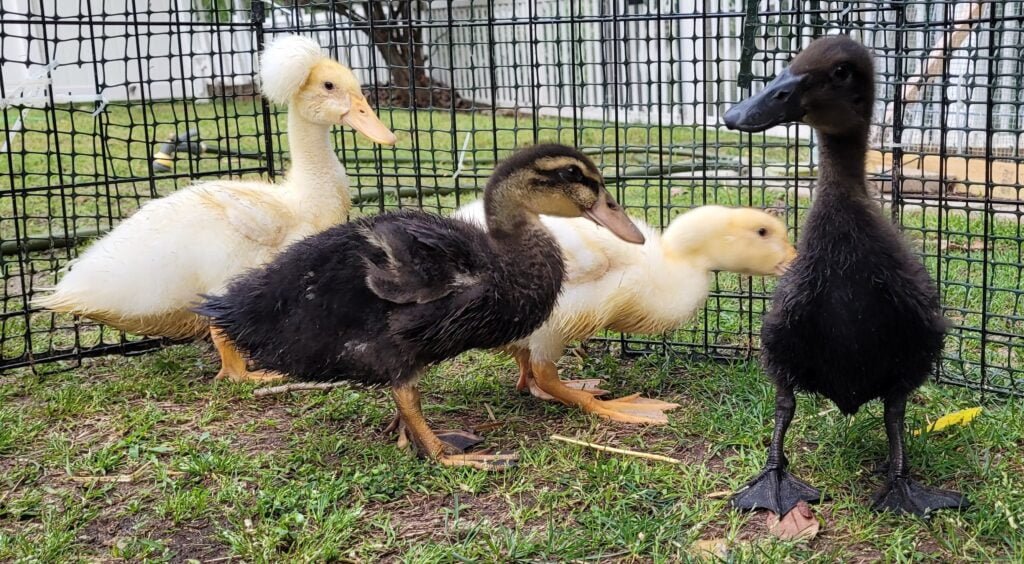
Caring for Your Ducklings: Tips for Happy, Healthy Birds
Once your ducklings are settled into their new home, here are some tips to ensure they thrive:
- Daily Care: Check on your ducklings daily to make sure they have clean bedding, fresh water, and enough food. Ducklings can be messy, so be prepared to clean their brooder regularly.
- Bonding: Spend time with your ducklings to help them get used to human interaction. Gentle handling and regular socialization will help tame your ducks and strengthen your bond. Read our post with the title “How To Get A Duck to Trust You?” to learn more.
- Outdoor Time: When your ducklings are old enough (usually around 2-3 weeks), you can start introducing them to the outdoors under supervision provided it is warm enough. Ensure they have access to a safe and secure outdoor area to explore and forage.
- Health Monitoring: Keep an eye on your ducklings for any signs of illness or distress. Common health issues in ducklings include pasty butt (a condition where droppings stick to the vent), respiratory infections, and leg problems. Consult a veterinarian if you notice any concerning symptoms.
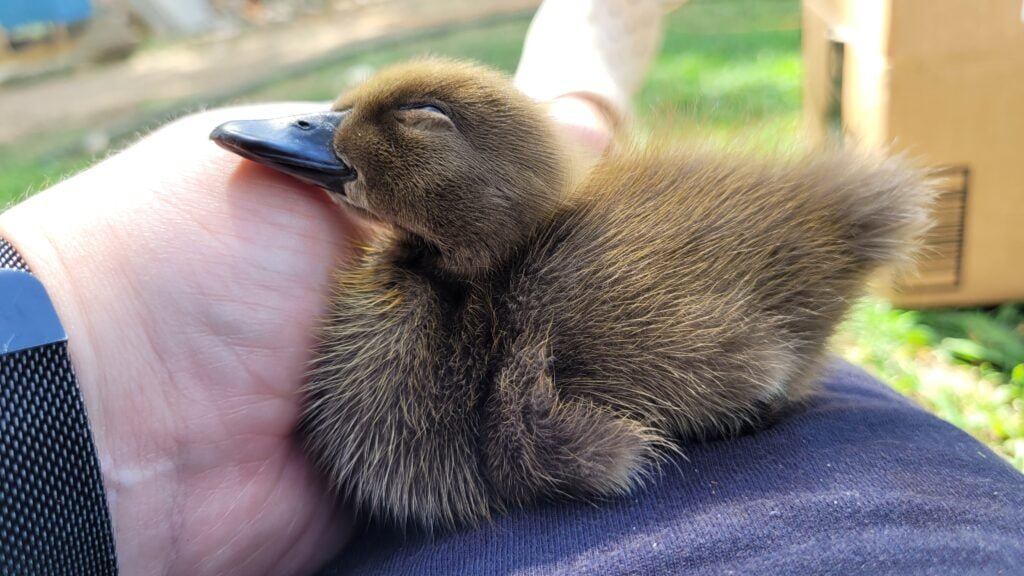
Frequently Asked Questions about Raising Ducklings
Q: What do ducklings eat?
A: Ducklings typically start with a high-quality duckling starter feed, transitioning to grower feed as they mature. They also enjoy treats like mealworms, chopped greens, and scrambled eggs for added nutrients.
Q: How do I keep ducklings warm?
A: Providing a brooder heater in their living space is essential, especially during their first few weeks of life. Maintain a temperature of around 90-95°F (32-35°C) initially, gradually reducing it as they grow feathers.
Q: Do ducklings need water to swim in?
A: While ducklings enjoy swimming, they should be introduced to water gradually and always under supervision. Shallow water is ideal for young ducklings, allowing them to splash and paddle safely.
Q: How often should I clean their living space?
A: Ducklings can be messy, so cleaning their living space regularly is crucial. Remove droppings and soiled bedding daily, and replace bedding as needed to maintain cleanliness and hygiene.
Q: Can ducklings be kept with other animals?
A: It’s essential to introduce ducklings to other animals cautiously and under supervision. While they can coexist with chickens and other poultry, interactions should be monitored to prevent aggression or injury.
Q: When can ducklings be introduced to the outdoors?
A: Ducklings can start exploring the outdoors under supervision once they are around 2-3 weeks old for a short time. They can move outdoors once they are fully feathered, which is at about 8 weeks of age. Ensure they have access to shelter, water, and protection from predators.
Q: How can I tell if my ducklings are healthy?
A: Healthy ducklings are active, alert, and have bright eyes. They should have clean feathers, eat and drink regularly, and produce firm droppings. Any signs of lethargy, distress, or unusual behavior should be addressed promptly.
Q: Do ducklings need special care during cold weather?
A: Ducklings are sensitive to cold temperatures, so provide supplemental heat and shelter during colder months. Ensure their living space is draft-free and well-insulated, and monitor their behavior for signs of chilling.
Q: At what age do ducklings mature into adult ducks?
A: Ducklings typically mature into adult ducks around 8-12 weeks of age, depending on the breed. At this point, they will have grown most of their feathers and can be transitioned to adult duck feed.
Q: How can I bond with my ducklings?
A: Spending time with your ducklings, talking to them, and offering treats can help build trust and strengthen your bond. Handle them gently and avoid sudden movements to ensure they feel safe and secure in your presence.
Q: Can I keep ducklings as pets in urban areas?
A: Before keeping ducklings as pets in urban areas, check local regulations and ordinances regarding poultry keeping. Ensure you have adequate space, shelter, and resources to meet their needs responsibly.
Q: Can I release ducklings to local ponds?
A: The short answer is NO! It is illegal in most states to release domestic animals into the wild. Ducks are no exception. Releasing ducklings to local ponds or bodies of water is a bad idea for several reasons. Firstly, domestic ducklings may not have the necessary survival skills to thrive in the wild, especially if they were raised in captivity. Secondly, releasing non-native duck breeds into local ecosystems can disrupt native wildlife populations and lead to environmental imbalances. Additionally, most domestic ducks can not fly, so they are not able to escape predators or relocate to other places. Learn more about duck dumping and why it is cruel.

Remember, raising ducklings requires patience, dedication, and a willingness to learn. By providing proper care, attention, and love, you can enjoy a rewarding journey with your feathered friends!
Growing Up Duck: Watching Your Ducklings Flourish
As your ducklings grow, you’ll witness their charming personalities emerge, from their curious waddles to their joyful quacks. With proper care and attention, your ducklings will mature into healthy and happy ducks, ready to embark on their own adventures in your backyard oasis.
And remember, raising ducklings is not just about providing for their physical needs; it’s also about fostering a loving and nurturing environment where they can thrive emotionally and socially. So, embrace the quirkiness of duck parenthood and enjoy every moment of your journey with these delightful feathered friends!
Happy duckling raising!
Freebie
Continue Reading:
- Keeping Ducks 101: A Beginner’s Guide to Duck Care
- How To Get A Duck to Trust You?
- 12 Things to Know BEFORE Getting Ducks as Pets
- What Do Ducks Eat? Your Guide To Feefeedding Ducks
- Essential Nutritional Needs of Ducks: A Complete Overview
- How to keep ducks safe from predators?
- Hatching Ducklings Like a Pro: Step-by-Step Incubation & Brooder Guide!
